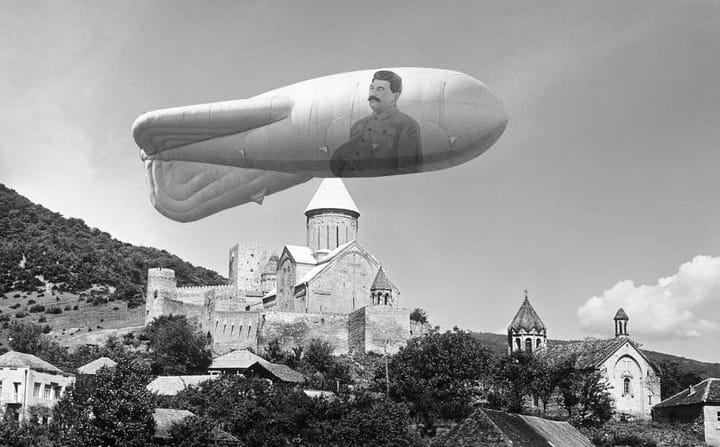Georgian Sentiments & Protest Culture
Along with the general history, Georgians also have a great protest culture.
On February 25, 1956, at the meeting of the Communist Party of the Soviet Union, Nikita Khrushchev made a speech in which he condemned the cult of Joseph Stalin. Khrushchev’s speech caused concern among many citizens of the Soviet Union. Since March, protests have started in Tbilisi and other cities. Georgian students walked the streets of Tbilisi with portraits of Stalin and Lenin.
The demonstrations in Tbilisi were brutally suppressed in blood.
However, we were left with a way of expressing protest, which was very innovative at that time.
According to the report, the students of the Tbilisi Academy of Arts painted a portrait of Stalin on a balloon in the Tbilisi Air Defense Armament and show their solidarity with the protesters.
Despite the party’s restriction of Georgian nationalism, Khrushchev’s policy of de-Stalinization was, paradoxically, a blow to Georgian national pride. The younger generation of the Georgians, not fully acquainted with the darker side of Stalin’s rule and bred on the panegyrics and permanent praise of the “genius” of Stalin, was proud to consider him a Georgian that ruled over great Russia, and, as believed widely, dominated the world. Now, Stalin’s denigration was seen as a symbol of the mistreatment of Georgian national consciousness at the hands of the Russian/Soviet rulers.
Patriotic sentiment mixed with the political protest was further inflamed by the sarcastic and bitter manner in which Khrushchev ascribed all horrors of the era to the “genial” leader Stalin, whom, as he ironically put it, the Georgians so much enjoyed calling “the great son of the Georgian nation”. Eduard Shevardnadze, then a Komsomol leader in Kutaisi and eventually to become President of post-Soviet Georgia, later recalled that Khrushchev’s ironic remark on Georgians at the end of his speech was particularly hurtful to the pride of Georgian youth.
The painful reaction caused by de-Stalinization in Georgia has been variously interpreted. It has been seen by many as a revival of Stalinism and by others as the first open expression of Georgian nationalism since the abortive revolt in 1924.


March 16, 2023
ENTREY ONE:
March 16, 2023. Name of the day.
March 17, 2023. Name of the day.
Fills in the information for each day and what you do.
And before that, for all days.
Otherwise besides the 5 presentations, you are without any control.
Nikolay